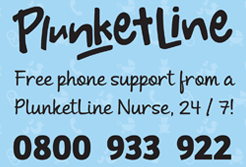Some parents and families become anxious when an infant arrives who is confirmed to have Albinism. We want to reassure and encourage new parents to enjoy loving and nurturing their infant.
Albinism is a genetic condition where people are born without the usual pigment (colour) in their bodies. Their bodies aren’t able to make a normal amount of melanin which is responsible for eye, skin, and hair colour. Most people with albinism have very pale skin, hair, and eyes. Albinism can affect people of all races, and there are different kinds of albinism.
Albinism Trust encourages all families with an Albino child or children to establish and maintain the best possible relationship with their general practitioner and other universally available health professionals. This includes the Well Child / Tamariki Ora programme, which is a series of health assessments and support services for children and their families from birth to five years that is an important gateway for parents to access primary and specialist health care, education and social services. This is important because children’s needs change as they mature and develop. In some situations providers of support services for the development, health and wellbeing of children under 5 might need to learn about Albinism. We suggest that Parents and Caregivers of children with Albinism ask questions and seek clarification of information they have concerns about. If you need advice from a trained Registered Nurse when your own Doctor is not available, call Healthline on 0800 611 116.
PlunketLine is a very good toll-free parent helpline and advice service available to all families, whānau and caregivers 24 hours a day, seven days a week. Call 0800 933 922 for parenting help from a Plunket nurse. Calls are also free from cell phones. 
Children with Albinism should enjoy the same opportunities as their siblings. Parents will be aware of the basics of safety, happiness and satisfaction. Its worth remembering there is ‘no one shoe which fits all’ when it comes to care of children. There is a very good information resource “Kidspot” which carries some notes on Albinism http://www.kidspot.co.nz/Conditions-&-Disorders-Congenital-disorders-Albinism+2222+173+article.htm
We believe all children should:-
- Enjoy life and interact as best they can.
- Participate in Early childhood education.
- Interact fully with their peers and siblings
- Play, explore and experiment with games.
- Avoid unreasonable exposure to the sun’s rays.
- Set their own ‘viewing’ distances for TV or Computers.
- Have access to bold or large print story books.
Some parents find it useful belonging to their local community “Toy Library” or “Play Centre”. We suggest it would be advisable having a conversation with “BLENNZ” so that learning and educational needs of the child can be assessed. Contact details for BLENNZ are on our links page. If required the Blind Foundation has a highly skilled Child and Families worker available for advice.
The two main concerns for people living with Albinism are :-
-
Eye sight and reduced or Low Vision.
-
Skin care and avoidance of Sun Burn.
For some people, albinism affects only their eyes. This is known as ocular albinism. People with ocular albinism usually have blue eyes and in some cases, the iris (the coloured part of the eye) has very little colour. The eyes might look pink or reddish. This is caused by the blood vessels inside the eye showing through the iris. In some forms of ocular albinism, the hearing nerves hearing may be affected and the person may develop hearing problems or deafness over time. It should be noted that hearing loss can also be present from childhood and unless assessed, complicate a child’s education. A parent has prepared a booklet to assist a child at school. Please click this link for a .pdf copy XXXX’s ‘A for Awesome’ book
For those who qualify extra help is available. The Ministry Of Health for instance offers a “Subsidy on Spectacles” as detailed on their web site or in this brochure, Enable-Spectacles-Subsidy
There is a very good UK Baycroft TV Video which is worth viewing on Youtube called Albino Kids Won’t let their condition hold them back.
Except for eye problems, most people with albinism are just as healthy as anyone else and can advance to become useful citizens in their own right. In every respect the future for people with Albinism is built on their childhood foundations.